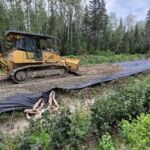Forest fuel reduction treatments are conducted at a stand level in the wildland–urban interface to reduce the potential for catastrophic loss caused by wildfire. Given the considerable expense of conducting these fuel treatments, fuels managers want to better understand the productivity and cost of commonly applied fuel treatments in order to prescribe cost-effective treatment techniques. Due to the limited data available and the myriad combinations of fuel treatment options and equipment types used in a diverse range of ecosystems, cost projections for fuel treatments are difficult to forecast reliably.

The second report, Productivity of Motor-Manual Forest Fuel Reduction Treatment Operations: Developing a User-Friendly Data Collection Protocol, presents a simplified data collection protocol for collecting data across a broader range of ecosites. The streamlined and simplified process presented includes a user-friendly format for in-field data collection by field crew supervisors.
Both reports are available for viewing or downloading from FPInnovations’ online research library.
For more information on the topic, contact the reports’ author, Steven Hvenegaard, Senior Researcher in FPInnovations’ Wildfire Operations group.





